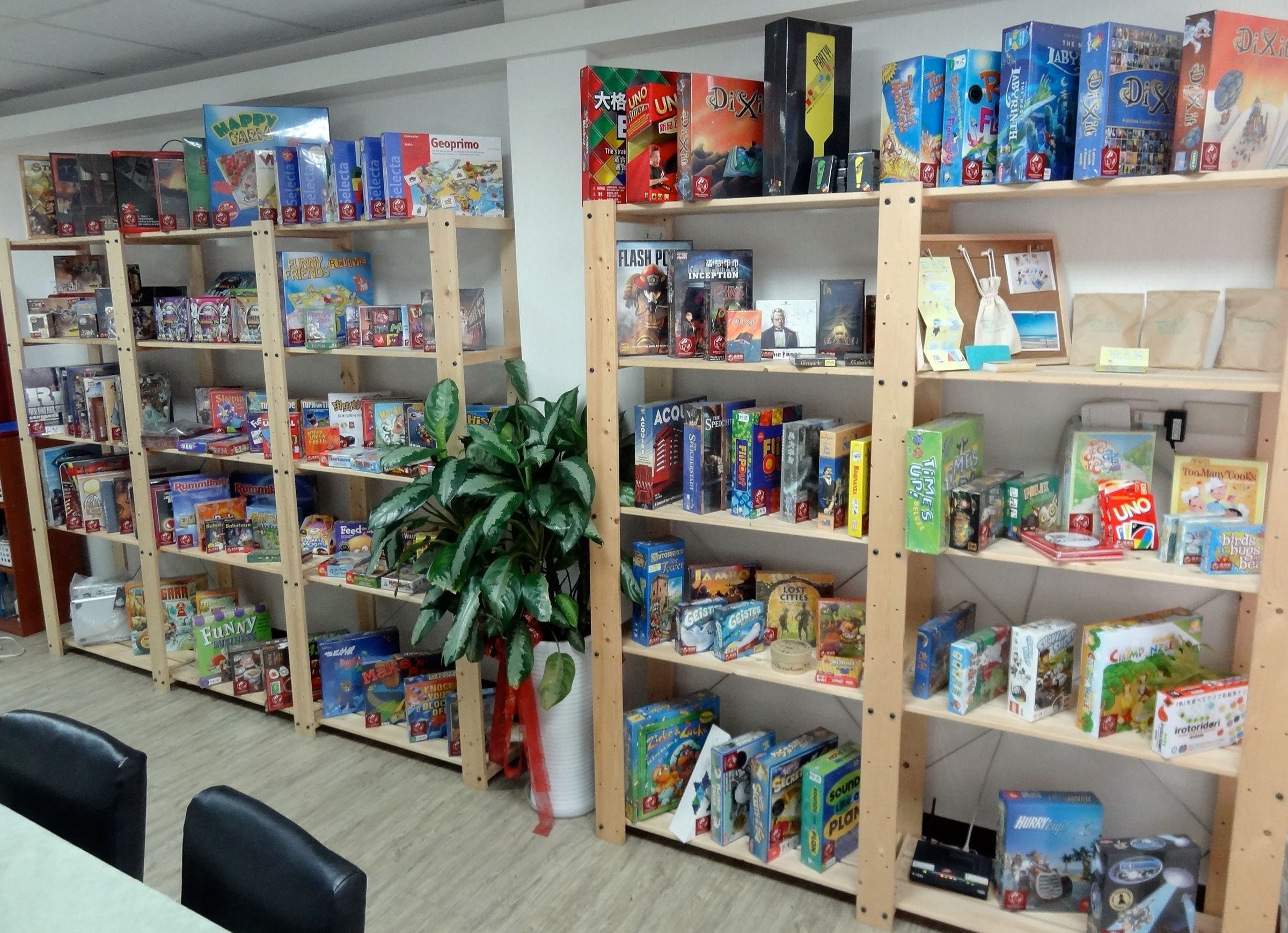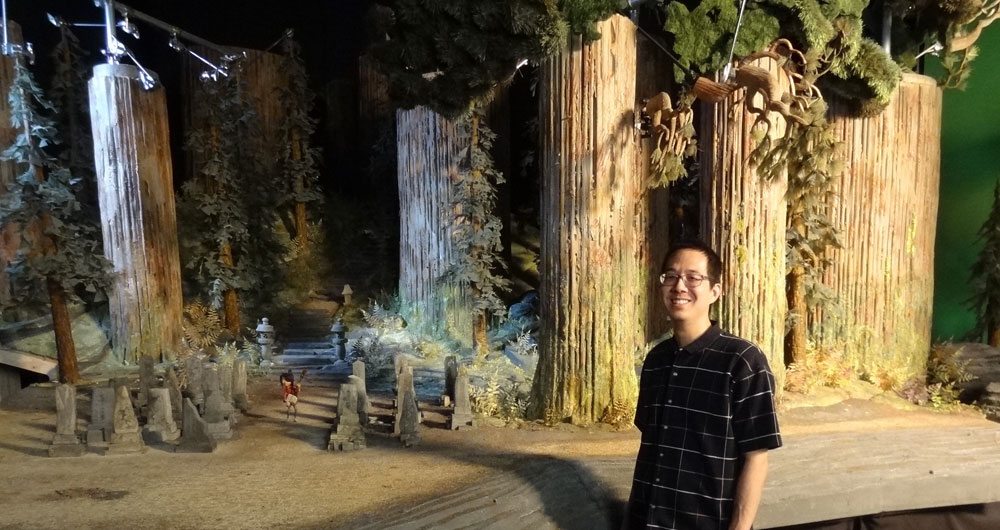
The first game store I visited was actually Phantasia, which has a branch near where I was staying. They’ve got five locations, mostly on the outskirts of Taipei. My dad accompanied me for my first visit — partly to help me find the place, and also to help me a bit with translation. We found the store all right, though not before taking a wrong turn from the bus stop — there’s some street construction going on in the area that threw us off. The Dapinglin location is actually a very short walk from the metro station if you go in the right direction. It’s an unassuming little storefront, but it is a storefront with a sign. The logo shows a red die with pawns and cards on it, so you can even tell (if you couldn’t read) that it’s a game store.
The store was bright and cheerful, with games shelved at an angle for easy browsing — but that photo you see above is pretty much the entire inventory of the store. There were maybe four or five tables along the opposite wall, and another shelf in the back (see photo below) where they had their demo games near the cash wrap. I met Chingchin Diau, the store manager, as well as Stanley, one of the regulars who gamed there often. After my initial glee at taking photos of board games translated into Chinese (Settlers of Catan! Thunderstone! Power Grid!*), I spoke with Diau about Phantasia and asked for her take on board game culture in Taiwan.

Phantasia has been around for about three years, and the Dapinglin store opened about a year ago. It’s not a huge store and the two times I stopped in on weekday afternoons it wasn’t really busy, though I imagine more people were able to come in the evening and on weekends. I did meet a middle-schooler named Stanley who was one of the regulars. He was very proud of having mastered in the neighborhood of a hundred games, and it sounded like he sometimes brought friends to the store to teach them games.
Diau said that Phantasia’s customers were roughly split half and half between those who purchased games and those who rented games (or paid to play at the store). They have a membership structure, where you can pay 300NT (roughly $10USD) for a lifetime membership, which gets you one free day and one free rental plus a discount on drinks and a 10% discount on purchases. For non-members, it’s 100NT (about $3) for a day of gaming, or 50NT per hour. You’re allowed to bring food or have it delivered, but you can’t play and eat at the same time. Phantasia also rents games, for between 100NT and 300NT depending on the purchase price of the game — because of the high cost of purchasing games, Diau said many of her customers like to rent it first before deciding whether to buy it.
I asked Diau if there are anything like board game conventions or if she knew about big gatherings outside of the store. She said there are sometimes small conventions featuring local game designers, but generally nothing very large, or even what we’d consider a moderate game convention in the US. They’d be more akin to small, informal events.

While I was at the store, a few young men came in to play games. Diau reads a little English but not much, and I discovered that most of their demo board games have Chinese rules inside, often just homemade versions if the game itself wasn’t translated. She also spent some time explaining the game to the players, though, so they didn’t have to sit and interpret the rules themselves. Phantasia also offers tutorial videos on their website (warning: the video on the front page auto-plays), though the entire site is in Chinese so it may not be as useful to you.
The environment at Phantasia was definitely more friendly to new gamers: from the way the games were displayed on the shelves to the larger tables to the tutorials make the hobby more approachable, and that seemed like it might be a better way to spread board gaming in Taipei. Phantasia also seemed more kid-friendly. While Kaseno at Alchemy didn’t seem to think many younger kids would play games, Diau encouraged me to return with my daughters to try out some games at the store. I ended up taking my younger daughter, who jumped at the chance to go play games.

We ended up playing a few games: Geistesblitz, which I picked up for myself and will write up later on; Otti Panzerotti, a memory-based game with plastic turtles who can swap shells; and Tumblin’ Monkeys, an old classic toy/game where you pull plastic rods out of a tree while trying not to let a bunch of monkeys fall through to the bottom. My daughter had a fun time, and I was encouraged to see that Phantasia stocked so many games that worked for young kids. There’s nothing like getting them hooked on games when they’re little!
Diau also gave me a copy of Turtle-Hare Race, the first game published by Phantasia. It’s another memory-based game, though each player has a secret goal card representing which cards they’re looking for, and then at some point there’s a mad scramble to grab the cards you need. The game is designed to be played by both very young players and very old players — it’s actually in conjunction with a hospital, with the idea that playing games and keeping your mind occupied can help stave off Alzheimer’s.
Phantasia Games — at least this store — definitely gave me a different impression of the state of gaming in Taiwan. I didn’t get a chance to visit any of the other Phantasia locations, or to meet the manager, Junting Lin, who apparently is more fluent in English and probably would have been easier for me to interview. Maybe next time!
Oh, and finally, it was at Phantasia that I was able to learn the Chinese term for board gaming: ???? (zhuo shàng yóu xì) — literally, “table top game” — or ?? (zhuo yóu) for short.
Next up: The Witch House

